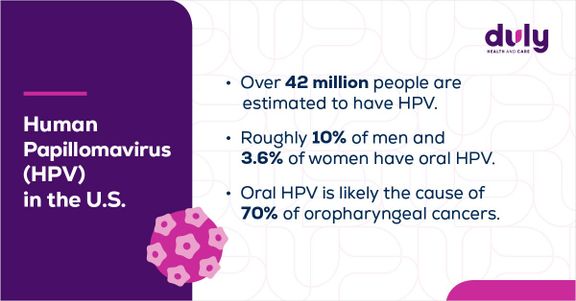When you think of sexually transmitted infections, you probably don’t immediately think of cancer. But when it comes to human papillomavirus (HPV) — the most common sexually transmitted infection (STI) in the US — cancer is a serious concern.
HPV is such a common STI that nearly all sexually active men and women will get the virus at some point in their lives. While there are effective vaccines to prevent HPV, it’s still easily spread through sexual contact. What’s more, oral HPV — or HPV that can cause a type of head and neck cancer called oropharyngeal cancer — is more common as you get older.

Source: https://www.cdc.gov/std/statistics/prevalence-2020-at-a-glance.htm
The connection between HPV and head and neck cancer isn’t always talked about, but their connection is significant — and it can have a major impact on your well-being. Here’s how.
What Exactly is HPV?
Human papillomavirus (HPV) is a group of over 200 related viruses. Sometimes, these viruses are spread through vaginal, anal, or oral sex.
HPV is common. Most people who are sexually active are infected with HPV within a few years of becoming sexually active. Anyone can be infected with HPV — regardless of sex, sexual orientation, or gender identity.
HPV viruses are usually put into two categories:
Low-risk HPVs, which usually don’t cause disease (except for, on occasion, genital warts)
High-risk HPVs, which can cause many kinds of cancer
Most of the time, thanks to the hard work of your immune system as well as the HPV vaccine, HPV doesn’t cause cancer.
If you are under the age of 45 and haven’t received the complete series of Gardasil or Gardasil 9, schedule an appointment with your Duly primary care provider.
However, if you have high-risk HPV for a long period of time, that puts you at risk for multiple kinds of cancer.
How is High-RIsk HPV Related to Cancer, Including Head and Neck Cancer?
A long-lasting HPV infection can infect the cells in your body. Once this happens, it can impact the ways cells talk to one another, causing them to multiply in an uncontrolled way. If these infected cells aren’t recognized and destroyed by your immune system, this can lead to precancerous cells.
If not treated, precancerous cells can turn into cancer.
Most of the time, people think of HPV as the cause of cervical cancer — which can happen if it infects the cells of your cervix. It can also lead to cancers of the anus, penis, vagina, and vulva if it infects cells in those parts of your body.
What’s less frequently talked about, however, is that oral HPV — which is spread through oral sex — can infect the throat and mouth, called the oropharynx. This is the part of your throat that includes the back third of your tongue, your soft palate, the back and sides of your throat, and your tonsils.
This is called oropharyngeal cancer, which is a type of head and neck cancer.
Oropharyngeal cancers are caused by an HPV infection, and the number is on the rise. Although HPV has been found in other head and neck cancers, HPV causes about 70% of oropharyngeal cancers in the United States.
Diagnosing and Treating Oropharyngeal Cancer
Preventing head and neck cancer through HPV prevention is the goal. But it’s also important to pay attention to your body for any changes that may signal a problem.
While oropharyngeal cancer may not always cause early symptoms, it can lead to:
A persistent sore throat
Trouble swallowing, moving the tongue, or opening the mouth completely
Unexplained weight loss
Ear pain
A lump in the back of the throat or mouth
A lump on the neck
A white patch on the lining of the mouth of the tongue that won’t go away
Coughing up blood
Your healthcare provider can diagnose oropharyngeal cancer using tests like a physical exam, a review of your health history, and scans, such as a positron emission tomography (PET) scan, computed tomography (CT) scan, and magnetic resonance imaging (MRI). Your PCP may refer you to an otolaryngologist (ENT) who can do an in-office endoscopy to evaluate further. They can also do a biopsy, where they remove a small number of cells and check for signs of cancer under a microscope.
Treatment for oropharyngeal cancer can include a combination of surgery, radiation therapy, chemotherapy, and targeted therapy (using drugs and other treatments to attack specific cancer cells).
Oropharyngeal cancers that are HPV-positive — meaning they were caused by an HPV infection — may have a better chance of completely being cured.
Preventing HPV to Prevent Head and Neck Cancer
HPV prevention is crucial for your overall health, including preventing head and neck cancer. The first step is getting an HPV vaccine, which is an effective way to prevent HPV infections of all kinds.
The HPV vaccine prevents more than 90% of cancer caused by HPV. In fact, infections with the kinds of HPV that cause most HPV-related cancers and genital warts are down nearly 71% among teen girls since the introduction of the vaccine.
The HPV vaccine is for both females and males. Children and teens should get the two-dose vaccination around ages 11 and 12. Adults up to age 45 who weren’t vaccinated as a child should also get the HPV vaccine.
You can also lower your risk of oral HPV by using condoms and dental dams as well as limiting your alcohol and tobacco use.
The HPV vaccine prevents new infections, but it does not treat existing ones. While there are recommendations to screen for cervical cancer caused by HPV, there are no standard screening tests for oral cancer. However, as a part of a routine dental exam, dentists usually look for signs of oropharyngeal cancer.
While head and neck cancer may not be your first thought when it comes to HPV, it’s important to be aware of this risk. By taking steps to prevent HPV and keeping up with regular health exams, including dental visits, you can set yourself up for a healthy future.
Health Topics:








